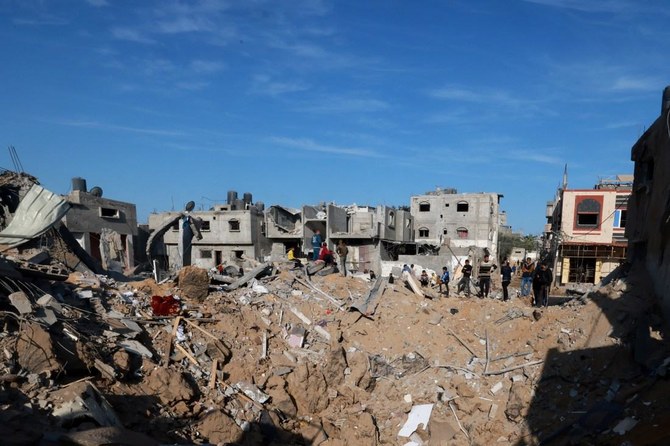ntense Israeli air strikes hit the south of the Gaza Strip on Monday, killing and wounding dozens of Palestinians, including in areas where Israel had told people to seek shelter, residents and journalists on the ground said.
Israeli troops and tanks also pressed the ground campaign against Hamas militants in the south of the enclave after having largely gained control of the now-devastated north.
Early on Monday, Israel ordered Palestinians to leave parts of Gaza’s main southern city, Khan Younis. But residents said that areas which they had been told to go to were also coming under fire.
Israel’s military posted a map on social media platform X with around a quarter of Khan Younis marked off in yellow as territory that must be evacuated at once.
Three arrows pointed south and west, telling people to head toward the Mediterranean coast and toward Rafah, a major town near the Egyptian border.
Desperate Gazans in Khan Younis packed their belongings and headed toward Rafah. Most were on foot, walking past ruined buildings in a solemn and silent procession.
But the head of the United Nations agency for Palestinian refugees in Gaza (UNRWA), Thomas White, said people in Rafah were themselves being forced to flee.
“People are pleading for advice on where to find safety. We have nothing to tell them,” he said on X.
In the territory’s northern part, the official Palestinian news agency WAFA said at least 50 people were killed in an Israeli air strike that hit two schools sheltering displaced people in the Daraj neighborhood of Gaza City.
Opinion
This section contains relevant reference points, placed in (Opinion field)
The Gaza health ministry could not be reached for comment on the report and it was not immediately possible to verify it independently. A spokesperson for the Israeli army said it was looking into the report.
Separately, the health ministry said at least 15,899 Palestinians, 70 percent of them women or under 18s, have now been killed in Israeli bombardments of the Hamas-ruled enclave in eight weeks of warfare. Thousands more are missing and feared buried in rubble.
Israel launched its assault to wipe out Hamas in retaliation for an Oct. 7 cross-border attack by its gunmen. They killed 1,200 people and seized 240 hostages, according to Israeli tallies — the deadliest single day in Israel’s 75-year history.
BIG CRATER
Bombing at one site in Rafah overnight had torn a crater the size of a basketball court out of the earth. A dead toddler’s bare feet and black trousers poked out from under a pile of rubble. Men struggled with their bare hands to move a chunk of the concrete that had crushed the child.
Later they chanted “God is greatest” and wept as they marched through the ruins carrying the body in a bundle, and that of another small child wrapped in a blanket.
“We were asleep and safe,” said Salah Al-Arja, owner of one of the houses destroyed at the site. “There were children, women and martyrs,” he said. “They tell you it is a safe area, but there is no safe area in all of the Gaza Strip.”
Israel accuses Hamas of putting civilians in danger by operating from civilian areas, including in tunnels which can only be destroyed by large bombs. Hamas denies it does so.
As many as 80 percent of Gaza’s 2.3 million people have fled their homes in the Israeli bombing campaign that has reduced much of the crowded coastal strip to a desolate wasteland.
Israeli forces largely captured the northern half of Gaza in November, and since a week-long truce collapsed on Friday they have swiftly pushed deep into the southern half.
Tanks have driven into Gaza from the border fence and cut off the main north-south route, residents say. The Israeli military said the central road out of Khan Younis to the north “constitutes a battlefield” and was now shut.
Hamas said its fighters clashed with Israeli forces in northern Khan Younis overnight.
ISRAEL’S GOALS IN NORTH ALMOST MET
The commander of Israel’s armored corps, Brig.-General Hisham Ibrahim, told Army Radio the military had almost achieved its goals in northern Gaza.
“We are beginning to expand the ground maneuver to other parts of the Strip, with one goal — to topple the Hamas terrorist group,” he said.
The military released footage of troops patrolling in tanks and on foot, in fields and in badly damaged urban areas, and firing from weapons, without specifying the location in Gaza.
Israel says its evacuation orders are aimed at protecting civilians from harm, and called on international organizations to help encourage Gazans to move to the areas labelled safe on Israeli maps.
The United Nations said the areas in the south that Israel has ordered evacuated in the three days since the truce ended had housed over 350,000 people before the war — not counting the hundreds of thousands now sheltering there from other areas.
In Khan Younis, many of those taking flight on Monday were already displaced from other areas. Abu Mohammed told Reuters it was now the third time he had been forced to flee since abandoning his home in Gaza City in the north.
“Why did they eject us from our homes in Gaza (City) if they planned to kill us here?” he said.
Israel’s closest ally the United States has called on it to do more to safeguard civilians in the southern part of Gaza than in last month’s campaign in the north.
But about 900 people have been killed in Israeli air strikes since the truce ended on Friday, Gaza health authorities said.
Omar Shakir, Israel and Palestine Director at Human Rights Watch, told Reuters: “All indications and reports suggest that the same pattern – of dropping heavy-duty bombs and using artillery in densely populated areas – is continuing.”

















